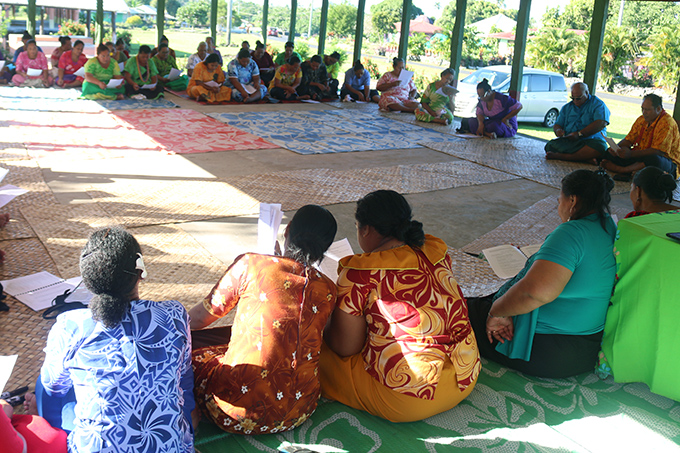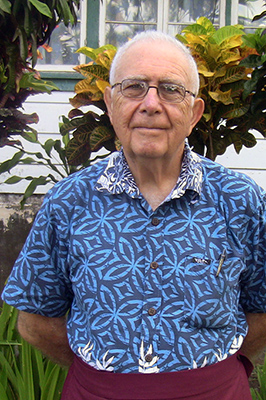
SEN
Education in Samoa – Learning to Live
School enrolment is high in Samoa, retention is fair compared to many other countries in the region, and the overall literary rate in the country is close to 99 percent. Yet, the national education coalition in Samoa, SEN, finds that there is an urgent need to strengthen and amend the educational system.
“What we see is an acute need to build an educational sector that also teaches people how to lead good lives. We need education to offer them the tools to build good lives – firstly by combating the two major problems Samoa is facing right now – epidemic violence and unprecedented levels of obesity and lifestyle diseases,” says Walter Vermeulen.
Healthy lifestyle on the curriculum
 Walter Vermeulen is a medical doctor and co-founder of the Samoan health organization METI – the lead agency in the Samoan Education Coalition, which is supported by Education Out Loud. He emphasizes the need to expand the scope of education in Samoa, to make it not only about numeracy and literacy but about equipping people with a larger set of skills to have agency and strike a better course for themselves and their communities.
Walter Vermeulen is a medical doctor and co-founder of the Samoan health organization METI – the lead agency in the Samoan Education Coalition, which is supported by Education Out Loud. He emphasizes the need to expand the scope of education in Samoa, to make it not only about numeracy and literacy but about equipping people with a larger set of skills to have agency and strike a better course for themselves and their communities.
“Take health. Today we have a staggering 81 percent of the adult population suffering from diabetes and other non-communicable diseases caused by obesity and unhealthy eating. It is heartbreaking. This crisis is partly caused by a lack of knowledge about health and nutrition and lack of motivation to change lifestyle – both of which could and should be influenced in various ways through the educational system,” says Walter Vermeulen.
SEN is working hard to push power holders to generally expand their understanding of the role of education, and to add health and non-violence to the list of subjects, schools should offer. Currently SEN is piloting a lunch project in primary schools to ensure all kids receive at least one healthy meal a day and to inspire and teach students to cook and eat healthier.
SEN is also advocating the Samoan authorities to add food and healthy lifestyle to the curriculum for both primary and secondary schools and are working with local authorities and community-based organizations to create awareness and offer training in nutrition and health.
Violence reduction starts in schools
While SEN is trying to amend and reshape the formal education system in Samoa, the bulk of the coalition’s work actually lies within alternative education – community-led, and community-based, life skills training for youth and adults. Hence, the importance of having organizations and cooperatives with a strong local presence and with extensive knowledge about health, nutrition, and food.
The same holds true for another important scope of work that lies with SEN – violence reduction. According to Walter Vermeulen, violence is rampant in Samoa and prevalent in all spheres of everyday life – in homes, in schools, among couples and on the street. And again, SEN finds that the educational system should play a key role in solving the problem.
One strain of work is focused on the formal school system – suggesting that teachers can help create a culture of peace within schools and schools can help develop social norms by adding non-violent communication and conflict reduction to the curriculum. Another strain of work is focused on communities to ensure a wide range of support and training is provided to adolescents, youth, and adults – specific initiatives offering students skills in conflict reduction, non-violent communication, vocational training and entrepreneurship as well as wider life skills and mentorship.
“Any kind of training could provide people with the means to build their future. This exposure would ease the frustration and desperation that currently mares many Samoans and help prevent future violence,” says Walter Vermeulen.
His vision for SEN is for its members to grow in capacity and strength to be able to offer relevant life skills training in all communities across Samoa as well as influence the formal school system to widen its scope and make “life literacy” one of its criteria for success.
Facts:
- Samoan National Education Coalition, SEN Established in 2019 as a coalition of 16 local civil society organizations, including farming cooperatives and health organizations among their members. Very focused on grass root level development and how to build a foundation for adult “life literacy” within and outside of the formal education system.
- Basic and secondary education in Samoa is free and accessible and enrolment as well as participation rates are high.
- Many drop out in or just before secondary school – assumingly because of school systems that seem to “focus on the best and forget the rest” and have very little focus on keeping the students motivated and inquisitive.
- Quality is fair and the overall literacy rate in Samoa is close to 99 percent.
- Contrary to the idyllic scenery in the tourist brochures, violence is rampant in Samoa as is obesity and lifestyle related illness. Together these two issues pose an unprecedented threat to Samoan society.
